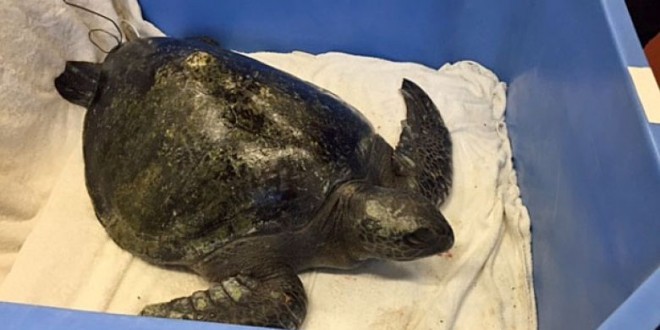A green sea turtle commonly found in tropical waters has been rescued from a beach on Vancouver Island.
The turtle is now being treated at the Vancouver Aquarium Marine Science Centre.
It was found Saturday morning by Parks Canada officers on remote Combers Beach in the Pacific Rim National Park Reserve.
“Reptiles are cold-blooded and they completely depend on their external environment to control their body temperature,” said Dr. Martin Haulena, head veterinarian at the Vancouver Aquarium Marine Science Centre. “When they get into water that’s too cold they get hypothermia, also known as cold-stunning. Everything slows down: heart, respiration rates, they can’t swim, they can’t forage – they get weaker and weaker.”
Admitted with a body temperature of 11.2 degrees Celsius, the turtle is being slowly warmed by just a couple of degrees per day, until it reaches normal, at 20 degrees or more. It’s received antibiotics, fluids, and care for several wounds on its carapace. The turtle’s sex has not yet been determined.
Green turtles are normally a tropical species found in warmer waters around Mexico and Hawaii, but occasionally may follow a warm current northward and end up in B.C. or even Alaska waters. “It’s something we see more often during years with above-average sea temperatures, such as during an El Nino period,” said Haulena.
The green sea turtle is designated as Endangered worldwide by the World Conservation Union (IUCN) Red List. They are not listed under Canada’s Species at Risk Act, because Canada is outside their range.
Saturday’s sea turtle rescue follows a similar rescue from the same beach last Thursday, of a Guadalupe fur seal, another warm-water species stranded outside its normal range. The sub-adult male is still in critical condition at the Vancouver Aquarium Marine Mammal Rescue Centre.
“There has not been much improvement in his condition,” said Haulena. “He’s lethargic, emaciated; he’s still not interested in food. Historically, this species has a poor prognosis once stranded.” In California, where they are more often rescued after stranding, approximately 30 per cent have made it to release.
Agencies/Canadajournal

 Canada Journal – News of the World Articles and videos to bring you the biggest Canadian news stories from across the country every day
Canada Journal – News of the World Articles and videos to bring you the biggest Canadian news stories from across the country every day

